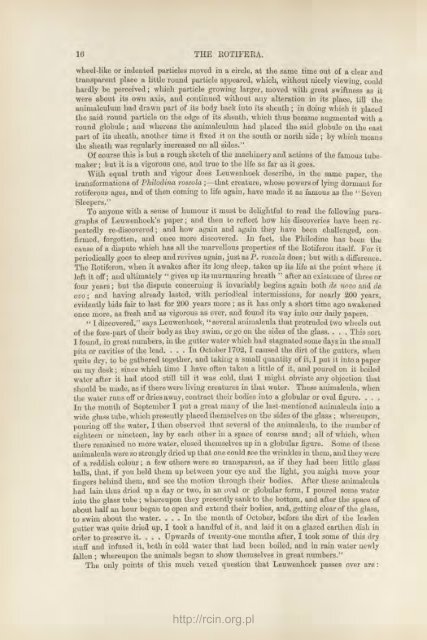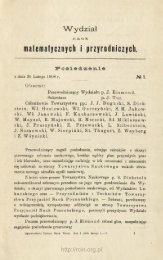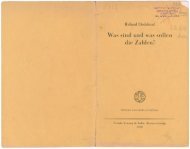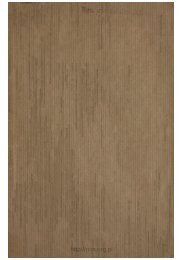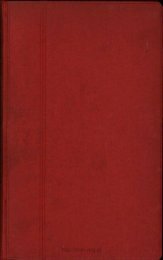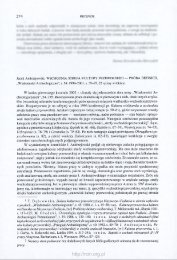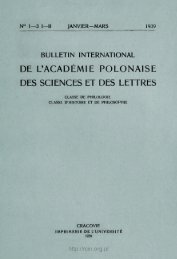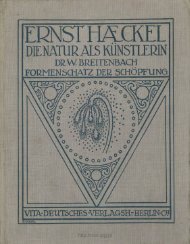You also want an ePaper? Increase the reach of your titles
YUMPU automatically turns print PDFs into web optimized ePapers that Google loves.
wlieel-like or indented particles moved in a circle, at tlie same time out of a clear and<br />
transparent place a little round particle appeared, which, without nicely viewing, could<br />
hardly be perceived; which particle growing larger, moved with great swiftness as it<br />
were about its own axis, and continued without any alteration in its place, till <strong>the</strong><br />
animalculum had drawn part of its body back into its sheath ; in doing which it placed<br />
<strong>the</strong> said round particle on <strong>the</strong> edge of its sheath, which thus became augmented with a<br />
round globule; and whereas <strong>the</strong> animalculum had placed <strong>the</strong> said globule on <strong>the</strong> east<br />
part of its sheath, ano<strong>the</strong>r time it fixed it on <strong>the</strong> south or north side; by which means<br />
<strong>the</strong> sheath was regularly increased on all sides."<br />
Of course this is but a rough sketch of <strong>the</strong> machinery and actions of <strong>the</strong> famous tubemaker<br />
; but it is a vigorous one, and true to <strong>the</strong> life as far as it goes.<br />
With equal truth and vigour does Leuwenlioek describe, in <strong>the</strong> same paper, <strong>the</strong><br />
transformations of Philodina roseola ;—that creature, whose powers of lying dormant for<br />
rotiferous ages, and of <strong>the</strong>n coming to life again, have made it as famous as <strong>the</strong> " Seven<br />
Sleepers."<br />
To anyone with a sense of humour it must be delightful to read <strong>the</strong> following paragraphs<br />
of Leuwenhoek's paper; and <strong>the</strong>n to reflect how his discoveries have been repeatedly<br />
re-discovered; and how again and again <strong>the</strong>y have been challenged, confirmed,<br />
forgotten, and once more discovered. In fact, <strong>the</strong> Pliilodine has been <strong>the</strong><br />
cause of a dispute which has all <strong>the</strong> marvellous properties of <strong>the</strong> Rotiferon itself. For it<br />
periodically goes to sleep and revives again, just as P. roseola does; but with a difference.<br />
The Rotiferon, when it awakes after its long sleep, takes up its life at <strong>the</strong> point where it<br />
left it off; and ultimately " gives up its murmuring breath " after an existence of three or<br />
four years; but <strong>the</strong> dispute concerning it invariably begins again both de novo and de<br />
ovo; and having already lasted, with periodical intermissions, for nearly 200 years,<br />
evidently bids fair to last for 200 years more ; as it has only a short time ago awakened<br />
once more, as fresh and as vigorous as ever, and found its way into our daily papers.<br />
" I discovered," says Leuwenlioek, " several animalcula that protruded two wheels out<br />
of <strong>the</strong> fore-part of <strong>the</strong>ir body as <strong>the</strong>y swim, or go on <strong>the</strong> sides of <strong>the</strong> glass. . . . This sort<br />
I found, in great numbers, in <strong>the</strong> gutter water which had stagnated some days in <strong>the</strong> small<br />
pits or cavities of <strong>the</strong> lead. ... In October 1702, I caused <strong>the</strong> dirt of <strong>the</strong> gutters, when<br />
quite dry, to be ga<strong>the</strong>red toge<strong>the</strong>r, and taking a small quantity of it, I put it into a paper<br />
on my desk; since which time I have often taken a little of it, and poured on it boiled<br />
water after it had stood still till it was cold, that I might obviate any objection that<br />
should be made, as if <strong>the</strong>re were living creatures in that water. These animalcula, when<br />
<strong>the</strong> water runs off or dries away, contract <strong>the</strong>ir bodies into a globular or oval figure. . . .<br />
In <strong>the</strong> month of September I put a great many of <strong>the</strong> last-mentioned animalcula into a<br />
wide glass tube, which presently placed <strong>the</strong>mselves on <strong>the</strong> sides of <strong>the</strong> glass ; whereupon,<br />
pouring off <strong>the</strong> water, I <strong>the</strong>n observed that several of <strong>the</strong> animalcula, to <strong>the</strong> number of<br />
eighteen or nineteen, lay by each o<strong>the</strong>r in a space of coarse sand; all of which, when<br />
<strong>the</strong>re remained no more water, closed <strong>the</strong>mselves up in a globular figure. Some of <strong>the</strong>se<br />
animalcula were so strongly dried up that one could see <strong>the</strong> wrinkles in <strong>the</strong>m, and <strong>the</strong>y were<br />
of a reddish colour; a few o<strong>the</strong>rs were so transparent, as if <strong>the</strong>y had been little glass<br />
balls, that, if you held <strong>the</strong>m up between your eye and <strong>the</strong> light, you might move your<br />
fingers behind <strong>the</strong>m, and see <strong>the</strong> motion through <strong>the</strong>ir bodies. After <strong>the</strong>se animalcula<br />
had lain thus dried up a day or two, in an oval or globular form, I poured some water<br />
into <strong>the</strong> glass tube; whereupon <strong>the</strong>y presently sank to <strong>the</strong> bottom, and after <strong>the</strong> space of<br />
about half an hour began to open and extend <strong>the</strong>ir bodies, and, getting clear of <strong>the</strong> glass,<br />
to swim about <strong>the</strong> water. ... In <strong>the</strong> month of October, before <strong>the</strong> dirt of <strong>the</strong> leaden<br />
gutter was quite dried up, I took a handful of it, and laid it on a glazed ear<strong>the</strong>n dish in<br />
order to preserve it. . . . Upwards of twenty-one months after, I took some of this dry<br />
stuff and infused it, both in cold water that had been boiled, and in rain water newly<br />
fallen ; whereupon <strong>the</strong> animals began to show <strong>the</strong>mselves in great numbers."<br />
The only points of this much vexed question that Leuwenhoek passes over are :<br />
http://rcin.org.pl


